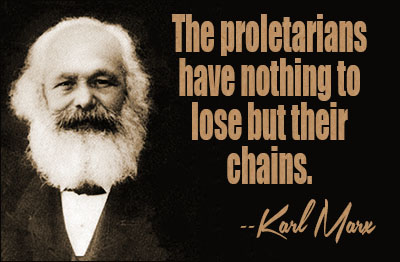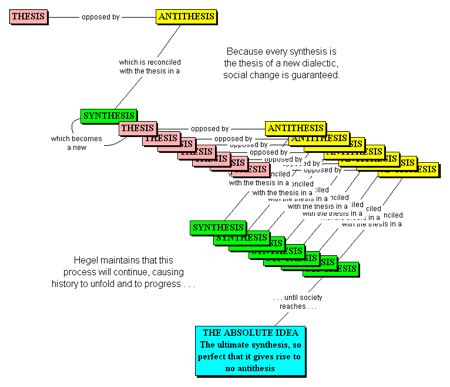Find an article on a current event and give me Marx's point of view on it.
- 1 paragraph summary of article.
- 1 paragraph using Marx's ideas to explore key points raised in the article.
- include the title, author, and web address of the article.
- to be completed in the comments section of this posting.
Thursday, April 30, 2015
Wednesday, April 29, 2015
Marxism- Rest of Ch. 1

Link to Text: Here
1. To many, Globalism and the world economy have been praised. What do you think Karl Marx would say given this quote "The need of a constantly expanding market for its products chases the bourgeoisie over the entire surface of the globe. It must nestle everywhere, settle everywhere, establish connexions everywhere." What would Marx's main issues with Globalism be.
2. What do you think Marx means by "the rapid improvement of all instruments of production, by the immensely facilitated means of communication, draws all, even the most barbarian, nations into civilisation." How is this possibly different in 2015 with the amount of technology we have?
3. Capitalism, at its core, is about profit and expansion. How does Marx feel about these two concepts. Give examples from the reading.
4. Give me a paragraph on the conditions of the proletariat as Marx understands it. What examples or comparisons does he give? Use examples from the reading.
5. Re-write the last two paragraphs in your own words. What is Marx describing here?
Monday, April 27, 2015
Karl Marx
Karl Marx
First published Tue Aug 26, 2003; substantive revision Mon Jun 14, 2010 found http://plato.stanford.edu/entries/marx/
"Karl Marx (1818–1883) is best known not as a philosopher but as a revolutionary communist, whose works inspired the foundation of many communist regimes in the twentieth century. It is hard to think of many who have had as much influence in the creation of the modern world. Trained as a philosopher, Marx turned away from philosophy in his mid-twenties, towards economics and politics. However, in addition to his overtly philosophical early work, his later writings have many points of contact with contemporary philosophical debates, especially in the philosophy of history and the social sciences, and in moral and political philosophy. Historical materialism — Marx's theory of history — is centered around the idea that forms of society rise and fall as they further and then impede the development of human productive power. Marx sees the historical process as proceeding through a necessary series of modes of production, characterized by class struggle, culminating in communism. Marx's economic analysis of capitalism is based on his version of the labour theory of value, and includes the analysis of capitalist profit as the extraction of surplus value from the exploited proletariat. The analysis of history and economics come together in Marx's prediction of the inevitable economic breakdown of capitalism, to be replaced by communism. However Marx refused to speculate in detail about the nature of communism, arguing that it would arise through historical processes, and was not the realisation of a pre-determined moral ideal."
1. Click here to access The Communist Manifesto.
2. Read from the beginning to the sentence that reads The bourgeoisie, historically, has played a most revolutionary part.
3. Identify 3 major ideas Marx is working with in the passages.
4. In what ways is Marx clearly influenced by Hegel? Give examples from the text.
Thursday, April 16, 2015
Multiple Selves and "Who am I?"

Read "To Thine Own Selves Be True" article. Found on Edline page.
Think about the main ideas discussed in the article.
Compare these ideas to some of the main ideas you have discovered in Hegel.
Write a 3-4 paragraph auto-biography using language/terminology found in the article and Hegel. Who are you? Which self do you think is your real self? How many selves do you have? Is unifying all of your selves possible like Hegel thinks?
Required- use 1 quote from Hegel (or from powerpoint) & use at least 2 quotes from the article.
Tuesday, April 14, 2015
Paragraphs 178-181 of The Phenomenology of the Mind
Monday, April 13, 2015
Preface to Phenom. (Part Two)
Read pp.5-10 (so that you have read up to but not including Section 7 of the Preface).
Provide a 2 paragraph summary for EACH section (Section 4, Section 5, & Section 6).
Link to Preface here.
Provide a 2 paragraph summary for EACH section (Section 4, Section 5, & Section 6).
Link to Preface here.
Thursday, April 2, 2015
Intro to Hegel & Preface to the Phenomenology of Mind

Georg Wilhelm Friedrich Hegel
First published Thu Feb 13, 1997; substantive revision Thu Jul 22, 2010
Along with J. G. Fichte and F. W. J. von Schelling, Hegel (1770–1831) belongs to the period of “German idealism” in the decades following Kant. The most systematic of the post-Kantian idealists, Hegel attempted, throughout his published writings as well as in his lectures, to elaborate a comprehensive and systematic ontology from a “logical” starting point. He is perhaps most well-known for his teleological account of history, an account which was later taken over by Marx and “inverted” into a materialist theory of an historical development culminating in communism. For most of the twentieth century, the “logical” side of Hegel's thought had been largely forgotten, but his political and social philosophy continued to find interest and support. However, since the 1970s, a degree of more general philosophical interest in Hegel's systematic thought has also been revived. (Information from Stanford Encyclopedia of Philosophy)
ASSIGNMENT- Due by start of class on April 14th.
Instructions
Read the quote from Pascal at the front of your packet.
Read the quote from Hegel on the Dialectic in Politics.
Watch the first 10-12 minutes of this video.
Read pp. 2-4 found here.
1. Re-write Pascal's quote in your own words. Afterwards, give a 2-3 sentence synopsis of what you think he is trying to accomplish?
2. Summarize how the dialectic works in Politics? What are some main ideas Hegel is raising in this passage concerning freedom?
3. Write a 2 paragraph summary of pp. 2-4 and the video. How is Hegel defining philosophy? What are some of the key terms he is using? How is he different from the other philosophers we have studied?
Subscribe to:
Posts (Atom)